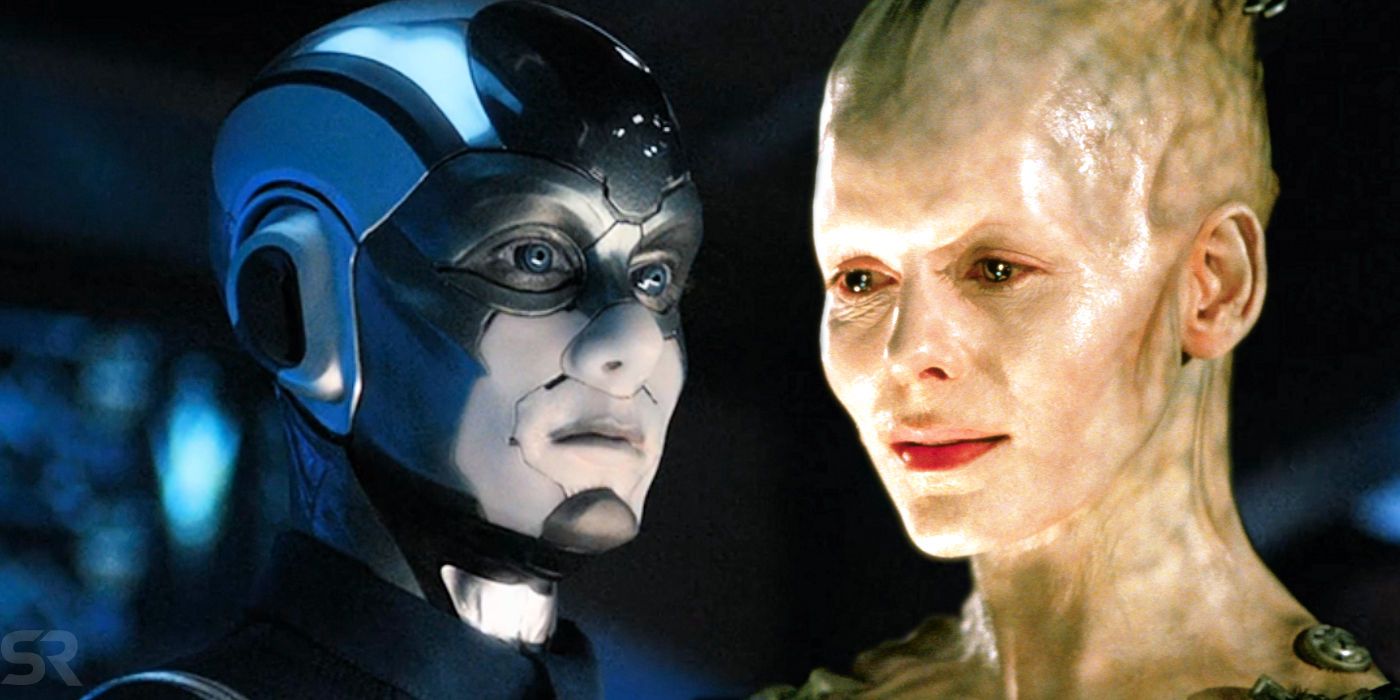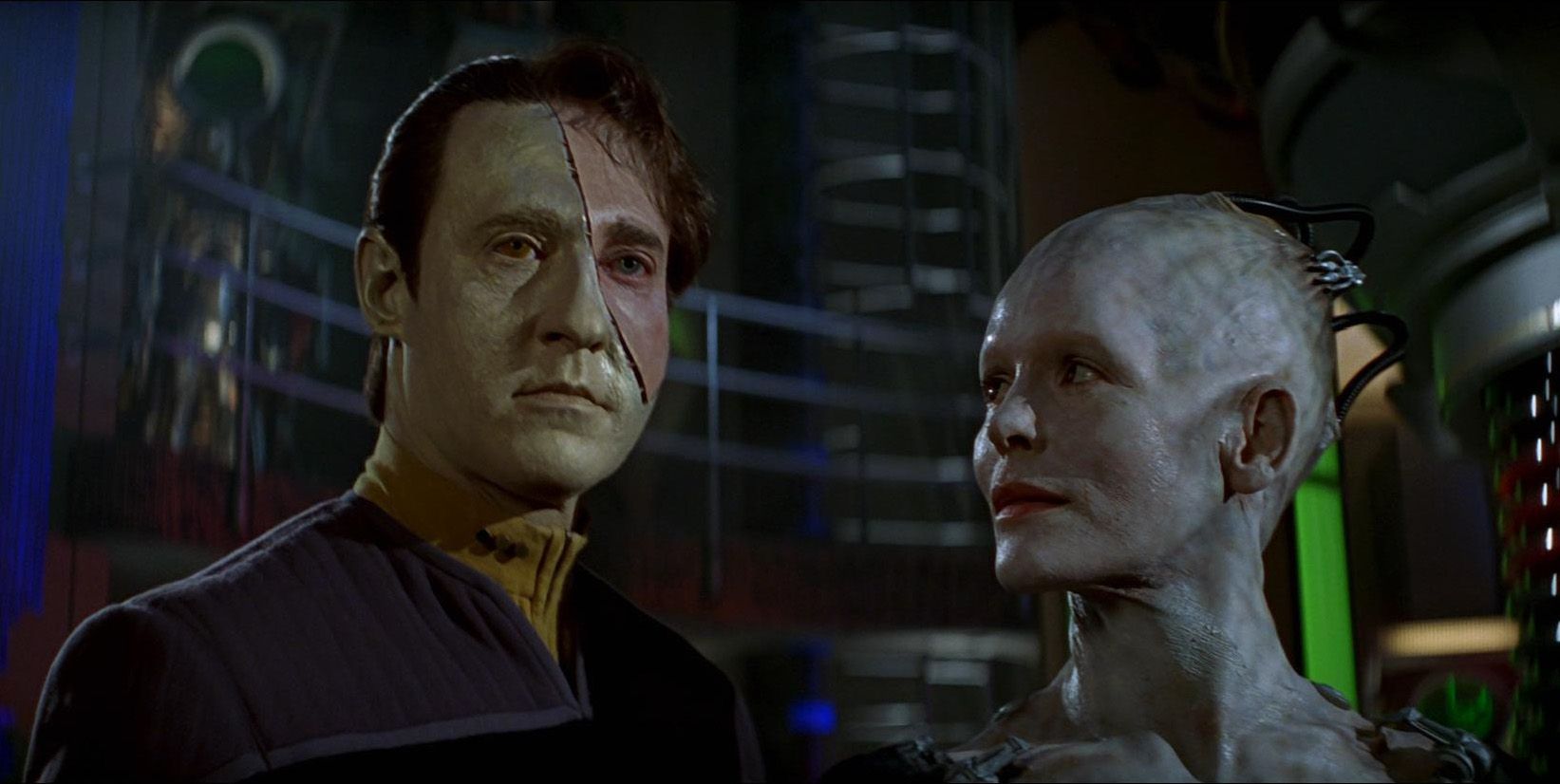Star Trek: Discovery’s malevolent A.I. bent on the destruction of all life in the galaxy bears a striking resemblance to one of Star Trek’s most iconic villains: the Borg. The two “species” echo each other in their distaste for organic life, fondness for time travel, and desire to eliminate anyone or anything that gets in their way of their mission to have the galaxy all to themselves.
When Q introduced the Borg to humanity, he showed the Enterprise a foe the likes of which they’d never seen. Their very existence was antithetical to Federation values as they consumed race after race in their quest to eliminate free will and individuality on a galactic level. And they would’ve pulled it off, too, if it hadn’t been for humans. The Borg desperately tried to add the Federation’s biological and technological distinctiveness to their own, but they were thwarted at every turn. At one point they even went back in time to try and stop First Contact so Earth would remain a pleasant little backwater and much, much easier to assimilate in the future.
Related: Star Trek: Discovery's Homage To Wrath of Khan (& What It Reveals About Spock)
The A.I. at work in Star Trek: Discovery has employed similar methods, has a similar motive, and even shares style points with the Borg. It’s a technology-based entity that despises all organic life and seeks to have the galaxy all to itself (and it’s also currently thwarted by humans). They even share a penchant for co-opting members of Starfleet to aid in their mission and red laser eyewear as evidenced in Ariam’s personality shifts and Leland’s unfortunate demise. In fact, Discovery season 2's arc is starting to evoke First Contact more and more with every episode.
Once its existence was threatened, the A.I. used time travel to return to a past that would supposedly result in their ultimate defeat. They want to change time so humans remain less of a threat and their evolution from whence or what they sprang from could progress unimpeded. They co-opt Discovery’s resident cybernetic in an attempt to further their cause just as the Borg queen did with Data to retrieve key access codes stored in his neural net, thus allowing her control of the Enterprise. And who could forget that probe’s cyber-tentacles connecting with Discovery’s shuttle and proceeding to insert itself into Discovery’s computer and Ariam? The A.I. and the Borg both seem to abhor wireless attacks when it comes to getting what they want.
All in all, though, the two aren’t direct analogs - the A.I. seeks to destroy, not assimilate, and the Borg don’t hate organic life so long as it proves useful (see: Locutus). And given how Star Trek canon is essentially infinite at this point, there are bound to be stories and characters that echo each other. But given that the A.I.'s story is largely incomplete and it shares so many commonalities with the Borg, a question that’s dogged Discovery remains: how much sharing is too much sharing?
In an effort to mine both the age of nostalgia and Star Trek’s huge history, Discovery hasn’t been shy about using previous Star Trek characters and stories as a backdrop. Each episode has been rife with references to past canon - big and small - and season 1 dove head-first into the Mirror Universe, a bold choice to use conceit that had only appeared on Deep Space Nine after its initial genesis on the Original Series.
The finale doubled down on the fan service introducing the Enterprise, Captain Pike, and the prospect of seeing Spock - the only character one could argue is more universally popular than James T. Kirk. Discovery’s liberal use of past canon has resulted in some phenomenal episodes to be sure, but an essential part of Star Trek is space as a frontier. The exploratory part of Discovery has taken a backseat to each season’s governing narrative, and while that’s understandable given its serialized nature, the lack of true exploration is starting to chafe a bit. Sometimes it feels more like a reimagining rather than another installment of a universe viewers want to see grow.
Next: Did You Catch Star Trek: Discovery's Futurama Reference?


